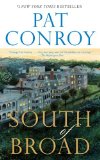Summary | Excerpt | Reading Guide | Reviews | Beyond the Book | Readalikes | Genres & Themes | Author Bio

He was more North Star than father. His curiosity about the earth ennobled his every waking moment. His earth was billion-footed, with unseen worlds in every drop of water and every seedling and every blade of grass. The earth was so generous. It was this same earth that he prayed to because it was his synonym for God.
My mother is also a Charlestonian, but her personality strikes far darker harmonies than my father's did. She is God-haunted and pious in a city with enough church spires to have earned the name of the Holy City. She is a scholar of prodigious gifts, who once wrote a critique of Richard Ellman's biography of James Joyce for the New York Review of Books. For most of my life she was a high school principal, and her house felt something like the hallway of a well-run school. Among her students, she could run a fine line between fear and respect. There was not much horseplay or lollygagging about in one of Dr. Lindsay King's schools. I knew kids who were afraid of me just because she was my mother. She almost never wears makeup other than lipstick. Besides her wedding band, the only jewelry she owns is the string of pearls my father bought her for their honeymoon.
Singularly, without artifice or guile, my mother's world seemed disconsolate and tragic before she really knew how tragic life could be. Once she learned that no life could avoid the consequences of tragedy, she softened into an ascetic's acknowledgment of the illusory nature of life. She became a true believer in the rude awakening.
My older brother, Steve, was her favorite by far, but that seemed only natural to everyone, including me. Steve was blond and athletic and charismatic, and had a natural way about him that appealed to the higher instincts of adults. He could make my mother howl with laughter by telling her a story of one of his teachers or about something he had read in a book; I could not have made my mother smile if I had exchanged arm farts with the Pope in the Sistine Chapel. Because I hero-worshipped Steve, it never occurred to me to be jealous of him. He was both solicitous and protective of me; my natural shyness brought out an instinctive championing of me. The world of children terrified me, and I found it perilous as soon as I was exposed to it. Steve cleared a path for me until he died.
Now, looking back, I think the family suffered a collective nervous breakdown after we buried Steve. His sudden, inexplicable death sent me reeling into a downward spiral that would take me many years to fight my way out of and then back into the light. My bashfulness turned to morbidity. My alarm systems all froze up inside me. I went directly from a fearful childhood to a hopeless one without skipping a beat. It was not just the wordless awfulness of losing a brother that unmoored me but the realization that I had never bothered to make any other friends, rather had satisfied myself by being absorbed into that wisecracking circle of girls and boys who found my brother so delicious that his tagalong brother was at least acceptable. After Steve's death, that circle abandoned me before the flowers at his graveside had withered. Like Steve, they were bright and flashy children, and I always felt something like a toadstool placed outside the watch fires of their mysteries and attractions.
So I began the Great Drift when Steve left my family forever. I found myself thoroughly unable to fulfill my enhanced duties as an only child. I could not take a step without incurring my mother's helpless wrath over my raw un-Stephenness, her contempt for my not being blond and acrobatic and a Charleston boy to watch. It never occurred to me that my mother could hold against me my unfitness to transfer myself into the child she had relished and lost. For years, I sank into the unclear depths of myself, and learned with some surprise that their haunted explorations would both thrill and alarm me for the rest of my life. A measurable touch of madness was enough to send my fragile boyhood down the river, and it took some hard labor to get things right again. I could always feel a flinty, unconquerable spirit staring out of the mangroves and the impenetrable rain forests inside me, a spirit who waited with a mineral patience for that day I was to claim myself back because of my own fierce need of survival. In the worst of times, there was something that lived in isolation and commitment that would come at my bidding and stand beside me, shoulder-to-shoulder, when I decided to face the world on my own terms.
Excerpted from South of Broad by Pat Conroy Copyright © 2009 by Pat Conroy. Excerpted by permission of Nan A. Talese, a division of Random House, Inc. All rights reserved. No part of this excerpt may be reproduced or reprinted without permission in writing from the publisher.
Your guide toexceptional books
BookBrowse seeks out and recommends the best in contemporary fiction and nonfiction—books that not only engage and entertain but also deepen our understanding of ourselves and the world around us.